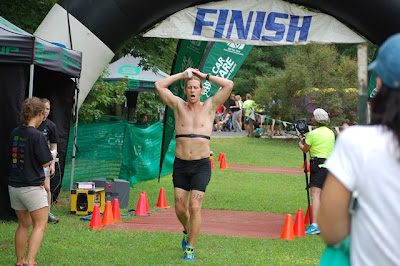So the big news really started happening around mid-May. Looking back now I can see that there was lots of work stress while I was at IBM and other non-exercise related factors that were causing me stress and anxiety, and it felt like my workouts were starting to fall short. I felt like I was putting in too much work and seeing declining performances and may be overtraining but really I had no idea. I needed to call in some big guns to get some help.
Of course, I ended up changing jobs, refinancing the house, camping, losing my grandmother, and all that other stuff that happened on Freaky Friday. After the dust settled, I did feel better about a lot of things. Life stress has a big impact on workout stress; one is good the other is bad but they both take recovery time. It's easier to control the workout load if the life stress is low.
After some extensive research I found a coaching service that I really liked with proven results on the race course and with a nutrition plan. QT2 Systems has the Core Diet plan that goes along with their triathlon coaching program. Their coaches are incredibly experienced professionals, and one of the packages they offer is a consultation with a weekly coaching package that was just what I needed.
As a self-coached athlete writing my own training plans, I have no way to validate my results. My approach to this Ironman training plan was to take a volume approach building the mileage long a slowly over the 24 weeks of warmup and base phase so that in the 12 week build phase I could add power and speed, and keep a really high volume to give me the best time possible on race day.
After looking over their coaches, Doug Maclean was the guy for me. He's a pro triathlete who still makes a living from coaching. Very experienced at Ironman racing and coaching everyday guys and kona qualifiers, I knew he could give me the validation and information that I needed. I saved up the cash and got the consultation with 12 weeks of coaching so that he could write my build phase training plan.
What I got seriously exceeded my expectations. I had some buyers remorse after I bought the service, but after I saw the plan and had the consultation I was completely blown away.
This guy barely plays the same sport we do. I mean he took 7th place overall at Lake Placid last weekend with a 5:01 bike split on the hardest bike course in the Ironman circuit, and followed it with a 3:08 marathon. Give me a break. I have to think the training plan that he wrote for me follows some of the same techniques that he uses to get those kind of results.
I was so blown away by the plan and picking up the new techniques like Tabatas and BST workouts, the layout of when to do strength and force style workouts, and how to do the easy stuff. It's a completely different approach. I can already tell a huge difference in my speed and power thresholds.
In the consultation we went over the plan, how to test what I had done in the base phase, nutrition, race weight, and race day strategies. Again he introduced me to a completely new way to approach the workouts and the sport as a whole.
After 6 years in triathlon, it's very unusual for me to find something new. I had a word doc open taking notes the whole time during the consultation. I totally did not expect to learn that much new information about triathlon.
Turns out, I've been too worried about how other people do. Treat triathlon like an individual time trial. Go out and run your race. It doesn't matter how many people pass you or where you place. If you feel good, race strong, and turn in a performance you can be proud of then it's a good race. Still, I have to admit I feel really good when I finish in the top third of my age group or top third overall. So Doug really knows the importance of the mental approach to the game and how that can influence our performance. Very cool.
The other concept that I've really taken to heart is the Durability Limiter. Age groupers like me can push a given speed for a mile, or 100 yards, or 5k. The overall goal of a training plan is to push through that durability limiter and expand it to hold our "5k pace" for the entire marathon. Obviously, this takes years to achieve. But if I can drop my 5k pace, or hold that hard line for an extra half a mile in this mid-week workout that's how we increase that threshold. The mental approach to extending durability can have a real influence, even on my races.
The Core Diet is a great nutrition plan, and there isn't a good way that I can explain it. I like it, I'm following it, and it's working really well. If you want the details you have to use the coaching service. I thought during the base phase I would take the last 8 lbs off, but didn't get my weight down under 180 until after I started using the core plan. I thought my workouts were going to suffer, but they got harder and the muscles responded. It's been great.
So I got the help that I needed and now have confidence for days. Doug wrote an amazing plan, with a Build 1, Build 2, Peak and Taper leading up to B2B. Tomorrow's post will be on how I made it through week 1 and what I thought about the workouts. It led up to the great race I had at Buckhorn last weekend!
Books I Read January 2026
20 hours ago






.jpg)















































